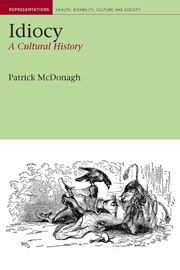Book contents
- Frontmatter
- Contents
- Preface and acknowledgements
- 1 Introduction: idiocy, culture and human relations
- 2 ‘Stripping our own hearts naked’: William Wordsworth and John Wilson read ‘The Idiot Boy’
- 3 A ‘pupil of innocent Nature!’ The wild boy of Aveyron goes to Paris
- 4 Diminished men: masculinity and idiocy
- 5 Essential women: femininity and idiocy
- 6 Holy fools, witty fools, depraved fools: folly, innocence and sin
- 7 History, society, economy: holy fools and idiots come home in nineteenth-century literature
- 8 Barnaby Rudge, idiocy and paternalism: assisting the ‘poor idiot’
- 9 Innocence, philanthropy and economics: the new ‘asylum’ idiot
- 10 Sensational idiocy
- 11 ‘The sins of the fathers’: idiocy, evolution and degeneration
- 12 Danger and degeneracy: the threat of the urban idiot
- 13 The problem of the feeble-minded: the Royal Commission, eugenics and eternal chaos
- Epilogue
- Bibliography
- Index
8 - Barnaby Rudge, idiocy and paternalism: assisting the ‘poor idiot’
- Frontmatter
- Contents
- Preface and acknowledgements
- 1 Introduction: idiocy, culture and human relations
- 2 ‘Stripping our own hearts naked’: William Wordsworth and John Wilson read ‘The Idiot Boy’
- 3 A ‘pupil of innocent Nature!’ The wild boy of Aveyron goes to Paris
- 4 Diminished men: masculinity and idiocy
- 5 Essential women: femininity and idiocy
- 6 Holy fools, witty fools, depraved fools: folly, innocence and sin
- 7 History, society, economy: holy fools and idiots come home in nineteenth-century literature
- 8 Barnaby Rudge, idiocy and paternalism: assisting the ‘poor idiot’
- 9 Innocence, philanthropy and economics: the new ‘asylum’ idiot
- 10 Sensational idiocy
- 11 ‘The sins of the fathers’: idiocy, evolution and degeneration
- 12 Danger and degeneracy: the threat of the urban idiot
- 13 The problem of the feeble-minded: the Royal Commission, eugenics and eternal chaos
- Epilogue
- Bibliography
- Index
Summary
From protests on town commons to petitions before Parliament, through the 1830s and 1840s Britain witnessed an explosion of working-class trade unionism and occasional agitation, primarily associated with the Chartist movement. ‘Chartism means the bitter discontent grown fierce and mad, the wrong condition therefore or the wrong disposition, of the Working Classes of England’, according to Thomas Carlyle, writing in 1839 (see Shelston 1971: 151). ‘What means this bitter discontent of the Working Classes? Whence comes it, whither goes it? Above all, at what price, on what terms, will it probably consent to depart from us and die into rest? These are questions’, he stressed, before offering some provisional answers (152). Chartism, he argued, grows from ‘the feeling of injustice’ (177) and expresses ‘the claim of the Free Working-man to be raised to a level, we may say, with the Working Slave; his anger and cureless discontent till that be done’ (215). These concerns occupied a great number of people, and one response considered by many – including Carlyle and the young novelist Charles Dickens – involved the development of a revamped, reinvigorated version of paternalism, one in which captains of industry assumed some of the social responsibilities formerly held (at least in theory) by the aristocracy and gentry, but which also relied on working people to develop greater moral responsibility and self-sufficiency.
Chartism was a largely working-class movement, although it involved a broad coalition of groups, that took its name from its People's Charter for social and political reform, presented to Parliament first in 1838 and again in 1842.
- Type
- Chapter
- Information
- IdiocyA Cultural History, pp. 170 - 191Publisher: Liverpool University PressPrint publication year: 2008

